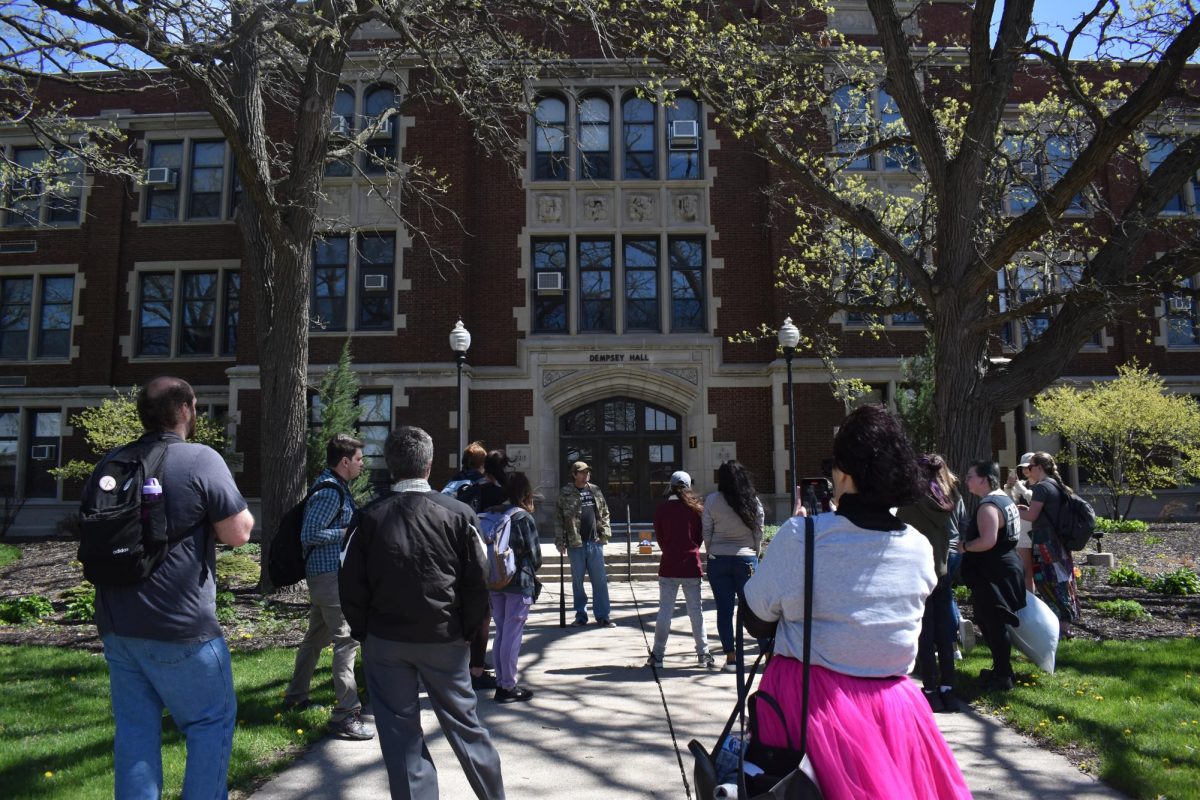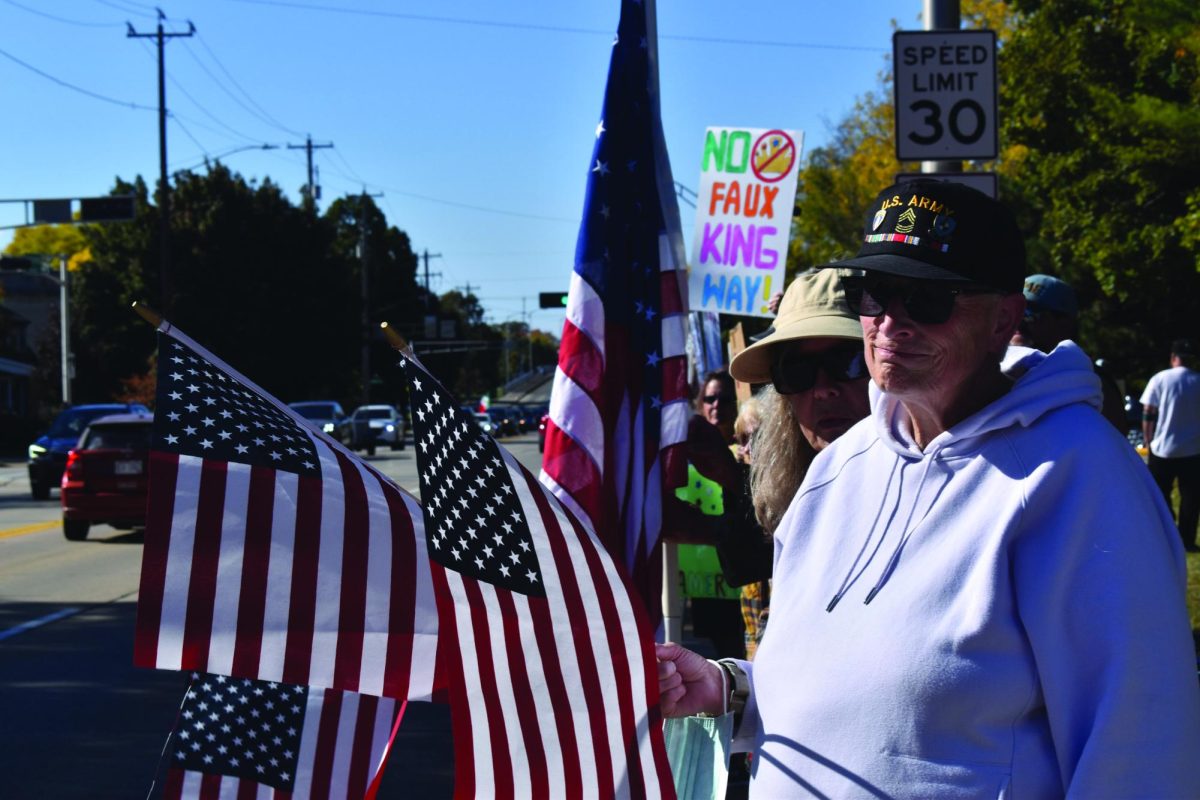A small group of UW Oshkosh students orchestrated a walkout in front of Dempsey Hall to advocate for better accommodations for students with disabilities May 1.
“There are some really major issues on campus, and as disabled students, we have not been quiet about these issues at all,” first-year student Alex Rosin-Borland said.
Rosin-Borland is one of several members of UWO Disabilities Advocates (UWODA), a student-led advocacy group for the disabled community at the university.
The group, which formed this semester, has accused the university of discriminating against students with disabilities and violating Section 504 of the Rehabilitation Act of 1973 and the Americans with Disabilities Act.
“We have talked to the chancellors and the vice chancellors many, many times to get these issues fixed, and unfortunately, the higher-ups of our university just don’t treat us like they treat the rest of the student body,” Rosin-Borland said.
Section 504 of the Rehabilitation Act of 1973 prohibits organizations from denying people with disabilities equal opportunities to program benefits. According to the university, there are approximately 800 UWO students who receive accommodations.
Student Melissa Mitchler, a military veteran with multiple sclerosis, said she has had to repeatedly prove her disability with doctor’s notes in order to receive accommodations, despite having come to agreements earlier.
Mitchler said that last year, a professor would not allow her to do a painting project on an easel brought from her home and instead required her to sit on the floor, despite her doctor’s recommendation.
“He would rather have sat there and watched a grown woman who fought for her country and his freedom cry, pumped full of opioid pain meds crying on the floor struggling [than accommodate my needs,]” Mitchler said.
Mitchler did not take any action against the university for the incident, but she did take a medical withdrawal from the class.
“My neck and back doctor (well, all of my doctors) cannot be happy enough for me to be done with this school because of the damage that it has done to my body and my well-being in general,” she said.
The walkout also brought to light other issues students with disabilities have faced around campus. Rosin-Borland said the PVC pipes running across campus grounds, which have been in place for over a year, make it difficult for people with mobility problems to get around.
“Those are not accessible,” she said. “Students who use mobility aids or have mobility deficits cannot navigate over those pipes at all.”
Currently, there are two ramps that allow students to get over the pipes, neither of which is bolted to the ground.
“They’re really unsturdy, and that’s just not safe,” Rosin-Borland said.
Currently at UW Oshkosh, there is one person responsible for handling the intake and coordination of all student-related ADA accommodations, according to accessibility coordinator Holly Ludwig Callaghan.
According to UWO Chief of Staff Alex Hummel, there are currently 3.6 full-time equivalent (FTE) staff members who have servicing students with disabilities in their job description. This number was down from 6.6 FTE staff members before 250 staff members were laid off last fall.
UWO Chancellor Andrew Leavitt said he feels the university has properly addressed students’ complaints and concerns of accessibility this semester.
“I consider our response to students’ concerns, as we learn of them, to be very responsive,” he said. “We never dismiss or hide or somehow try to minimize the concerns of students.”
However, there is room for improvement, Leavitt said, particularly with an aging campus infrastructure.
“Certainly, the facilities continue to be an ongoing challenge, given the inventory that we have, primarily 1960s buildings,” he said.
He said the university does its best to include several accessible facilities in each building, such as two sets of elevators in a single building in case one is out of order.
“We move as quickly as we can to address maintenance concerns as they occur,” he said.
Leavitt also listed other accommodations the university offers to students with disabilities, including personalized prioritized snow removal on campus and early alerts for at-risk grades.
He said he commends UWODA for shedding light on issues on campus, and that the university aims to address all concerns.
“Bravo to the UWODA for, you know, making sure that they are holding us accountable,” he said. “But at the same time, I’d like you to know that we’re acting with all deference towards making sure all of our students have the ability to learn.”
Mitchler said she plans to continue advocating for UWO students with disabilities even after her graduation on May 18.
“I will keep up the fight; I will help them,” she said. “And I think having an [alumna] as part of the organization is something that’s very powerful.”
At the same time, Mitchler said, she feels she shouldn’t have to fight so hard to get accommodations.
“In 1990, we passed the ADA, and now it’s 2024 and we’re still fighting this fight,” she said. “As a school, we could do better.”









